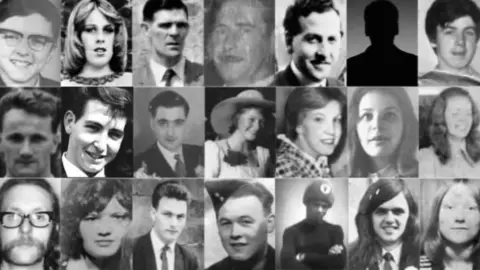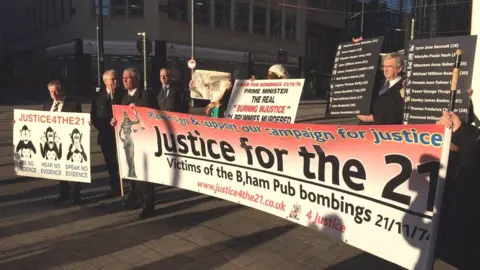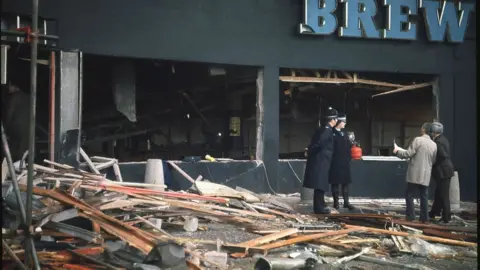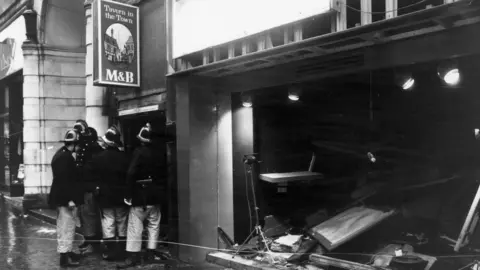Birmingham pub bombing inquests: Suspects will not be named
 BBC
BBCSuspects in the 1974 Birmingham pub bombings will not be named at fresh inquests, the appeal court has ruled.
Coroner Sir Peter Thornton challenged an earlier High Court decision to allow evidence about alleged suspects to be included in the inquest hearings.
Judges at the Court of Appeal have now ruled in the coroner's favour.
Two IRA bombs exploded in city centre pubs killing 21 people. Relatives have campaigned for inquests to include the so-called "perpetrator issue".
Those responsible for the attacks have not been prosecuted and the original inquest in 1974 was adjourned to allow the criminal investigation to take place, but never reopened.
Lord Chief Justice Lord Burnett announced on Wednesday the coroner had made "no error of law" in his original decision to exclude investigations into who was responsible for the bombings.
He added: "We allow the appeal and restore the original decision."
Julie Hambleton, whose sister Maxine was 18 when she was killed in the bombings, said she was "beyond disappointed" with the decision.
She said the families now have until Friday to decide whether to appeal against the decision, adding: "Without the perpetrator issue being a part of the scope [of the inquest] how can you ever possibly finish the jigsaw? You have got a major part of it missing.
"We will continue to fight for true justice and accountability because, if we don't, it is clear the British establishment don't care.
"We will take stock of what the decision states, we will speak to our legal team to get their assessment of the decision and then either decide to appeal or whether to just continue on, move forward and move on to the inquest process."

Mrs Hambleton said they understood the legal reasons from the coroner's perspective, but added: "If he was to use Hillsborough as a direct, current, up to date example, they brought in the perpetrator issue and that has now followed-on to potential prosecutions. What is so different about our case?
"It has a massive impact on all of us. Our health is affected, we are continually re-traumatised, every single time we do interviews, every time we have to go to court and get decisions like this, but we will pick ourselves up, brush ourselves down and we will continue to fight."
Relatives had previously argued the inquests could not take place without naming suspects, while their lawyers said discussing potential perpetrators "is central to the case".

Analysis
By Sima Kotecha, BBC Midlands Correspondent
It's been a long running courtroom saga, and today another stage has been reached in a story likely to continue for months or even years.
The Court of Appeal has sided with the coroner by stating the complexity of the case, along with the time elapsed since the attacks, makes it arduous to look into who was behind the bombings and why.
The ruling concludes an inquest's role is to answer four key questions: who died, how, when, and where. It states "the idea these inquests after 44 years could unearth further evidence capable of bring perpetrators to criminal justice cannot reasonably be sustained".
But for some of the families of the victims it's another blow, and the prospect of ever achieving justice for their loved ones seems bleaker.

The bombing in the centre of Birmingham on 21 November 1974 was the deadliest peacetime attack in the UK at the time.
Two bombs planted by the IRA ripped through the Mulberry Bush and nearby Tavern in the Town pubs, killing 21 and injuring 220.
The Birmingham Six were jailed for the murders and served 17 years behind bars before their convictions were quashed.
Five West Midlands Police officers were charged with perverting the course of justice in connection with the original criminal investigation, but a judge ruled in 1993 that a fair trial would be impossible.

During the latest appeal proceedings before Lord Chief Justice Lord Burnett, Lady Justice Hallett and Lord Justice McCombe, lawyers for the coroner said the hearings will not resolve the "enduring injustice" for victims and their families.
Peter Skelton QC, representing the coroner, said the victims, their families and the public interest "cannot be served" by a promised resolution that "cannot be delivered".
The High Court decision followed a judicial review brought on behalf of the bereaved families by Mrs Hambleton.
Victims' campaign group Justice 4 the 21 has said it would be "utterly redundant to have the inquests unless the perpetrators, their associates and those who prepared and planted the bombs are included".
Hugh Southey QC, representing the families, told the appeal judges: "There is the utmost public interest in the proper investigation of who was responsible for the Birmingham bombings.
"The families of the deceased said to the appellant [Sir Peter] that the investigation of this issue was so important to them that if it did not form part of the scope of the inquest 'we may as well not have an inquest at all'."
 Getty Images
Getty ImagesAn inquest was opened days after the bombings, but it was adjourned because the case was subject to a criminal investigation.
Despite the conviction of the Birmingham Six, and the subsequent overturning of the guilty verdicts, the inquest was never resumed.
In June 2017, Louise Hunt, the senior coroner for Birmingham and Solihull, said inquests would be reopened.
After reviewing police evidence and submissions from interested parties, she said there had been a "wealth of evidence that still has not been heard" about the atrocities.
Amendment 14 March 2019: This story has been updated to reflect the most recent information that 220 people were injured in the blasts.
